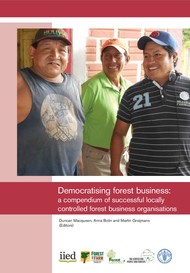Securing Rights to Wood Resources for Charcoal Production in Ghana: A case study of the Atebubu-Amantin District

Local charcoal enterprises in Ghana have for decades provided the bulk of the energy needs of the majority of urban households; contributed to the household incomes of both urban and rural dwellers; and provided a source of employment for many during off-season farming. The taxes and levies from the charcoal trade serve as a major source of revenue for district assemblies in the producing areas and traditional authorities. Access to wood is guided by customary rules and custodians of the land and/or traditional authorities often charge 20% value of produced charcoal for right to harvest the. Since the main sources of wood for charcoal production are fallow lands and farms, statutory bodies like the Forestry Commission (FC), Energy Commission (EC) and District Assemblies do not regulate wood for charcoal production beyond the latter collecting levies and taxes for the District Assembly‘s internally generated funds. Both charcoal producers and District Assemblies note a charcoal-related decrease in vegetation cover. But while members of the Assembly general view charcoal production as a threat, producers voiced their willingness to replenish the resource base through woodlot establishment. But for this to happen, financial and technical assistance are needed. The Forest Investment Programme (FIP), the Strategic National Energy Plan (SNEP) of 2006-2020, and the draft Bioenergy Policy offer some form of hope for charcoal producers to explore how to establish woodlot and plantations through upfront finance (in line with REDD+). This report makes a series of recommendations for that process including the need for a charcoal platform for all stakeholders to discuss these issues; introduction of carbon tax on charcoal; introduction of incentives for the establishment of integrated woodlots; and detailed value chain work to target market related interventions.
Cite this publication
Available at https://www.iied.org/g04060






